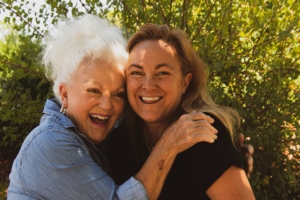The holiday season can be especially challenging for those who have lost a loved one. The idea of spending time with family and friends can be a painful reminder of who is no longer with us. At Your Nurse Advocate Consulting, we understand how difficult this time can be and want to offer support.
We’re here to support you throughout this difficult time and offer expert guidance and resources. Remember, there is hope, and healing is possible. Let’s navigate this journey together. Don’t be surprised if it can take almost a year to feel like yourself again. Every grief journey is different. Some people get through it sooner than others. There is no right or wrong amount of time just yours as long as you are taking positive steps to move through your grief you are ok. If you don’t feel things are getting better, please consider professional help. There is no shame in reaching out. We all need a hand once in a while.
In this blog post we will share six strategies to help you handle grief and loss during the holidays. . These strategies are designed to give you the tools you need to honor your loved ones, while also taking care of yourself.
1. Honor Your Loved One– Incorporate your loved one’s memory into your holiday traditions. Lighting a candle, sharing a favorite dish, or donating to a charity in their name can be a beautiful way to remember and honor them. Create a memory board or photo album to remember your loved one. Share stories and reminisce about the good times.
2. Prioritize Self-Care- A healthy self-care routine is crucial to coping with grief and loss, especially during the holidays. While it may be tempting to focus solely on the needs of others, don’t neglect your own emotional and physical needsDuring this time, it’s easy to neglect your physical and emotional needs.
Make sure to take care of yourself by getting enough rest, staying active, and reaching out to supportive friends and family. Practice self-care by getting enough rest, exercise, and nutrition. Practice mindfulness techniques such as meditation or deep breathing exercises to help manage stress and anxiety.
3. Practice Gratitude- It can be challenging to feel grateful when we’re consumed by grief. Take a few moments every day to write down something you’re thankful for. Focusing on positive things can help shift our perspective and bring a new level of appreciation.

4. Create New Traditions- It’s okay to change things up during the holidays. Consider creating new traditions that bring joy and comfort. Playing games, watching movies, or volunteering at a local charity can help bring some positivity to this difficult time.
5. Seek Support- You don’t have to go through this alone. Reach out to a support group, therapist, or nurse advocate to assist with resources. We’re here to provide a listening ear and offer guidance as you navigate through the grieving process.
Connect with Others- Reach out to others who have experienced loss and connect with them. You may find comfort and support in sharing your feelings and experiences with others who can relate. Hospice agencies have ongoing grief support groups. Even if your loved one was not a part of their hospice services oftentimes they welcome anyone in their community to take advantage of their grief support groups.
6. Give Yourself Time- Acknowledge your feelings: It’s okay to experience sadness during the holidays. Give yourself permission to feel and express your emotions.

Everyone handles grief differently. I have had past families get angry with me at the loss of their loved one and tell me they hope they never see me again. I have had other families reach out to me after more than 6 months to share their feelings and express their sorrow and wished they would have handled things better. There is no right or wrong way, only your way.
I have several family members that I have watched go through the stages of grief while losing spouses. None were the same and some spent more time in different stages. Denial and Anger are the hardest to watch and one must make sure you don’t take things personal and make the issues about you vs. understanding how they are coping with the loss. When things start to return to normal, and you see them becoming their “old self” again you know they are moving through and getting closer to the final stage of acceptance.
You will possibly see them starting new hobbies, moving away or staying in the family home. Again no right or wrong, just whatever helps them to move on. Some will travel and fill their days with new adventures.
Some may find a new person to love. This is a time to check our own feelings and avoid our concerns of being selfish and looking at this through our own eyes vs. their eyes. My daughter lost her husband unexpectedly and this was the hardest time for me to watch her go through this. They were not married long and had no children. It was very hard when she finally was able to begin to imagine her life with someone else. We found ourselves comparing him to her lost husband. Not a good idea. No matter what we were not bringing him back. At the end of the day with her partner of choice, I was able to tell him “Thank you for giving my daughter a second chance to be happy.” That is all we want for her and we need to move on as well. They have a beautiful little girl spreading her wings as a toddler and that warms my heart.

Know you will experience all the stages of grief on your journey to recovery. According to Kübler-Ross, the five stages of grief are:
- Denial
- Anger
- Bargaining
- Depression
- Acceptance
One must travel through all the stages to successfully accept the loss of a loved one. Again, there is no time-line as long as you continue to move forward.
Set Boundaries. It’s important to communicate your needs with friends and family during this time. Be honest about what you can handle and what you can’t. It’s okay to let others know when you’re feeling overwhelmed or need some alone time. Don’t be afraid to respectfully decline invitations or set limits on how much time you spend with others.
It’s crucial to remember that grief is a unique experience, and everyone’s situation is different. Don’t shy away from saying no to events or activities that may be emotionally taxing, even if they’re considered traditional holiday celebrations. Your mental health should be the priority, and you shouldn’t feel obligated to participate in activities that don’t serve your emotional needs.
Grief doesn’t have a timeline, and healing takes time. Allow yourself to feel your emotions, even if they’re unpleasant. It’s essential to be gentle with yourself and accept that healing is a process.
Remember, grief is a unique process, and it’s okay to feel a range of emotions. Our nurse advocates are here to provide you with the expert guidance, support, and education needed to navigate this process with confidence and compassion.
The holidays can be a challenging time to handle grief and loss, especially for those caring for aging parents. Sometimes we put pressure on other family members to “come see grandma for Christmas, it might be the last time you get to see her.” While this may or may not be true, try to take into consideration the feelings of your aging loved one and what they want. As humans, we tend to look at things through our own lens vs. the lens of others we care about. This is a good time to strengthen our “empathy” skills and try to put ourselves in their shoes.
At Your Nurse Advocate Consulting, we’re here to support you through the holiday season and beyond. Call us today to schedule a virtual consultation with our Nurse Advocates or sign up for our online courses to learn more about caring for your aging parents. Let us help you navigate the journey with compassion and empathy.
Conclusion:
At Your Nurse Advocate Consulting, we are both former hospice nurses, We understand that coping with loss during the holidays can be overwhelming. We’re here to support you throughout this difficult time and offer expert guidance and resources. Remember, there is hope, and healing is possible. Let’s navigate this journey together. By implementing these six strategies, you will not only survive the holidays but find ways to thrive and honor your loved one’s memory. We hope this blog post has provided you with valuable insight and helped you understand that continued support is available.
Thank you for trusting us with such a delicate topic. We wish you all the joy the holiday season can bring and successful management of your grief this year.
See you back her soon,
Pam and Linda,
Your Nurse Advocates
Compassionate Care for Aging Parents, Peace of Mind for Adult Children.
Resources:
Ultimate Your Nurse Advocate Free Resource Guide
Free checklist 14 Ways to Remember a Loved One
Your Nurse Advocate Free Resources




